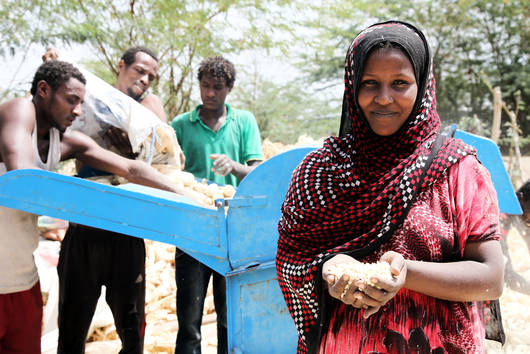Areas of work
Structure of the Division
The ESP Division is composed by the Office of the Director; the Social Protection (SOCPRO) Team; the Gender Team; the Decent Rural Employment (DRE) Team; the Rural Institutions, Services and Empowerment (RISE) Team; the Land Tenure Team; the Right to Food Team; and the Socio-Economic Research and Analysis (SERA) Team.
The Office of the Director coordinates and leads the work of the ESP Division. The Office of the Director ensures that social issues are well integrated into the main areas of work of FAO, including food security, nutrition, poverty reduction, sustainable agriculture, fisheries and forestry and rural development. The Office of the Director provides administrative oversight of the Division's work and ensures a direct link with the Economic and Social Development stream (ES).
Contact: Mr Benjamin Davis, Ms Lauren Philips
The Social Protection (SOCPRO) Team strengthens the capacities of national social protection systems to expand coverage of adequate social protection, in particular in rural areas, by generating evidence and advising on the design of policies and programmes and delivery mechanisms so that these are adapted to the specificities of rural populations. In doing so, SOCPRO seeks to increase the positive impacts of social protection on gender equality, climate change adaptation and mitigation, economic inclusion, improved nutrition, and resilience among rural households. Contact: Mr Alejandro Grinspun, Mr Marco Knowles
| The Decent Rural Employment (DRE) Team fosters the generation of decent employment opportunities in agri-food systems. The team contributes to global, regional and national processes related to key issues such as youth employment, rural migration, child labour, green jobs, working conditions, and availability of data and evidence. Through advocacy, capacity building, and technical cooperation, it proactively supports governments in the formulation of inclusive decent rural employment policies, strategies and programmes, targeting vulnerable groups, particularly youth, migrants, women and children. To achieve this, the team partners with other UN agencies, civil society, producers’ organizations, academia and the private sector. Contact: Mr Peter Wobst | The Gender Team is responsible for strengthening the capacity of governments and other stakeholders to formulate gender-responsive agricultural and rural development policies and programmes. The team also coordinates the implementation of FAO’s Policy on Gender Equality (2020-2030) and the work of the cross-cutting theme to empower women and reduce gender inequalities in agriculture, food security and nutrition. Contact: Ms Tacko Ndiaye, Ms Clara Park |
The Rural Institutions, Services and Empowerment (RISE) Team Contact: Mr Adriano Campolina | The Land Tenure Team Contact: Mr Adriano Campolina | The Right to Food Team Contact: Mr Alejandro Grinspun |
The Socio-Economic Research and Analysis Team (SERA) generates rigorous evidence to support the design and implementation of policies and programmes to foster inclusive rural transformation processes. The team’s strategic research agenda cuts across the thematic areas of work of the division and seeks to inform global debates around inclusive rural transformation based on cutting edge evidence. It focuses particular attention on providing evidence-based insights to address the global challenges of climate change adaptation and economic inclusion in rural areas.
Contact: Mr Nicholas Sitko











